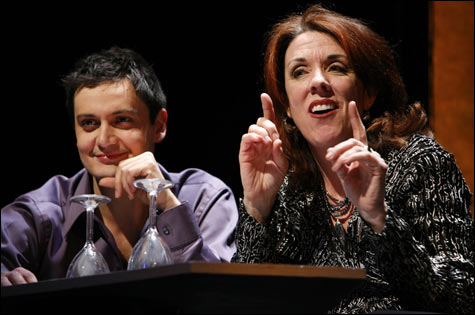
THE LITTLE DOG LAUGHED: Robert Serrell and Maureen Keiller do lunch with “he, meaning him.”
|
Frailty, thy name is society — or so suggest two comedies of manners currently on view but written 340 years apart. In Molière’s 1666 The Misanthrope (presented by New Repertory Theatre at the Arsenal Center for the Arts through February 10), it’s the world at large — or at least its upper-crust component — that suffers the rampant weakness of hypocrisy. True, the sex to which Hamlet first attached the moniker of frailty is seen to display two pretty faces. But even the play’s protagonist, the truth-telling Alceste, who’s painfully in love with a coquette whose candor he can hardly admire, is twisted into a pretzel of pretense. Douglas Carter Beane’s 2007 Tony nominee, The Little Dog Laughed (presented by SpeakEasy Stage Company at the Calderwood Pavilion through February 16), ferrets out falsity among a more specific elite: the meeting-taking, image-making ambition mongers of Hollywood. Sometimes an arrow aimed at a smaller target can have a sharper sting (particularly if you’re the target, though voyeurism has its own rewards). So it is that, though New Rep presents an elegantly playful Belle Époque revival of one of Molière’s most perfect works, The Little Dog has the last — if possibly not the lasting — laugh.
The archer-than-thou Beane, author of the screenplay To Wong Foo, Thanks for Everything, Julie Newmar and the book for the campy Broadway musical Xanadu, based The Little Dog Laughed in part on his own experience battling the movie monster, which masticated and in the end spit out his heretofore best-known play, As Bees in Honey Drown. Taking its name from the “Hey Diddle Diddle” nursery rhyme, The Little Dog Laughed, which transferred from Off Broadway to Broadway and garnered a Tony nomination (along with a win for actress Julie White), focuses on a sexually confused, up-and-coming male movie star who’s just won an award and is on the brink of the big time. But the character who puts out the greatest satiric spark is his agent, a ruthlessly clever lesbian power broker who’s not going to let her client throw away burgeoning stardom — or her 10 percent of it — on an equivocating romance with the rent boy he drunkenly orders up in the wake of his award win.
Beane’s way with well-articulated one-liners is fabled, and they pop here like beads of oil in a frying pan. The play, much of it written in bravura, interwoven staccato monologues and duets, is sharply funny. But it aims at more than that. Beane means to skewer the soul-strangling, myth-making core of the Hollywood machine. Movie-star-on-the-move Mitchell falls for male prostitute Alex and seems on the verge of putting a pickax through the door of the Hollywood closet. He and agent Diane part ways — though not before a dizzyingly acerb scene in which the two both narrate and enact, without the on-stage presence of the crucial third party, their calculated lunch-time seduction of a gay New York dramatist whose “property” they want to purchase as a vehicle for Mitchell. Throughout the meeting, the invisible writer is identified as “he, meaning him” and played like a piano. When, it seems, he asks for Diane’s “word” that she will not twist his gay love story into a hetero Hollywood romance, she reflects, “My word? What kind of negotiation ploy is that?”
Sweet hustler Alex, who’s even more ambivalent than Mitchell about being gay, has a casual girlfriend named Ellen who’s just been pink-slipped from her job as live-in love to an older novelist. Here Beane, who is 48, would seem to be sending up the cynicism of the younger generation. At one point, Ellen announces of herself and Alex, “We’re 24; hope is dead.” This disenchanted Westchester princess is a piece of work. When she develops a predictable little problem of her own, Diane comes up with a cynical solution the younger woman is happy to embrace. But Alex turns out to be the most honest character in Beane’s wittily brittle comedy, which is rendered in Paul Melone’s stylish production with its bitchy edge honed but also with a human touch.
As Diane, Maureen Keiller, a proven master of poised sarcasm, first appears sporting the gun-metal-gray gown she wore to the awards show. It’s an apt color choice, since the character’s a tight Tinseltown cannon. Power is mother’s milk to Diane, who’s attached to her cellular earphone and little else. And Keiller, smile frozen in place, renders her a perfectly put together if not utterly unflappable movieland Mephistopheles who relishes what Alex labels “parlor games for mean people.” Robert Serrell brings to Mitch sufficient sincerity that his reversion to narcissism comes as a surprise. Angie Jepson conveys both the little girl lost and the shallow-stream piranha in Ellen. And Jonathan Orsini makes the boyish, bed-headed Alex smarter than he at first appears: he may not yet know what makes him run, but in the end he gets the direction down. As for “he, meaning him,” revenge must be sweet.